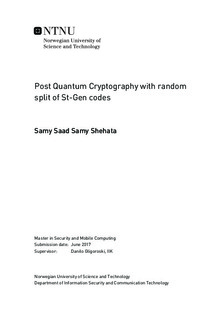| dc.description.abstract | Most current standardized cryptographic systems rely on the discrete logarithm problem and integer factorization problem for security. While these problems are considered hard using classical computers, quantum computers have been shown to provide extensive speedups using the likes of Shor's algorithm to break such systems. Post-quantum cryptography is a new direction of research that aims at creating cryptographic primitives able to resist quantum attacks. Many existing algorithms are believed to be secure in the presence of quantum computers, including code based and lattice based cryptographic algorithms. The McEliece cyrptosystem is a code based scheme that have existed for 30 years and remains unbroken with certain modifications. Two algorithms, based on the McEliece scheme, have been developed as candidates for standardization as quantum resistant schemes for encryption and digital signature. These schemes are based on a new family of codes called staircase generated codes and new technique of splitting the generator matrix to protect against structural attack. In this thesis, we will provide working implementations of these schemes as well as an extensive analysis of their security and practicality. | |

